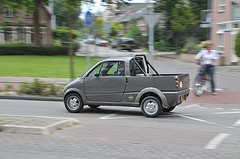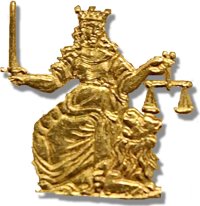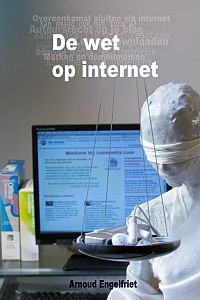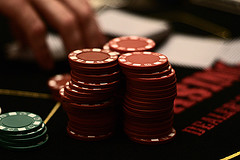 Copyright is not fit for this digital age, and needs to be changed, so say two representatives of the Dutch national library in a letter to daily NRC yesterday. In their epistle (Dutch) Martin Bossenbroek and Hans Jansen, managers Collections & Service and E-strategy respectively of the Koninklijke Bibliotheek (Royal Library), the Dutch national library, explain how difficult it can be to run large-scale digitization programs when for a large number of books it simply is not clear whether they have returned to the public domain or not:
Copyright is not fit for this digital age, and needs to be changed, so say two representatives of the Dutch national library in a letter to daily NRC yesterday. In their epistle (Dutch) Martin Bossenbroek and Hans Jansen, managers Collections & Service and E-strategy respectively of the Koninklijke Bibliotheek (Royal Library), the Dutch national library, explain how difficult it can be to run large-scale digitization programs when for a large number of books it simply is not clear whether they have returned to the public domain or not:
Copyright is a good thing, but the code that enshrines this right is too much of a good thing in its current form. In the digital age, it misses its targets. For hundreds of thousands of 20th century rights holders, it offers no protection, recognition and reward, but only the prospect of oblivion. An adaption of copyright law to the demands of the 21st century is needed urgently, otherwise the building of a digital library of any serious proportion will remain an illusion.
[Because of the difficulty of locating the heirs of long-dead authors, you cannot safely re-publish works that came out a 100 years ago.]
Both institutions and companies are keeping a safe distance from this copyright danger zone, and this will result in unbalanced digital collections. The digital library of the 21st century will have a gaping hole where works of that age should be. Hundreds of thousands of authors will never be found again. For them the chance of an epiphanous find followed by a second, digital life will definitely be gone.
This scenario can hardly be the meaning of a law that should protect an author’s rights. Before anything else, an author has the right to be read. That is why it is high time for an Internet exception for non-commercial use in the Dutch copyright law, one better thought through than the changes of 2004. Since then, heritage institutions are allowed to offer their collections electronically to the general public, but only from within their own building, using an intranet. That’s just not how the Internet works.
The authors go on about orphaned works, and how a mixture of Scandivian and Anglo-Saxon orphan works law could produce a best of both worlds: mixing extended collective licenses with the opt-out principle. Collective licenses, also known as levies, are funds paid by the public into one big pot, and redistributed to the copyright holders. In a lot of jurisdictions radio is paid for this way. This makes radio possible: if there were no collective licenses, a radio broadcaster would have to negotiate separate contracts with artists for each track they play. At least, so the theory goes. Opt-out means the author or their heirs has to state explicitly not to want to participate. Copyright law is opt-in by default, but stops functioning in areas where the rights holders cannot be traced, or only with immense difficulty. It is something authors have brought upon themselves with their support of the Berne Convention, which outlaws any sensible scheme for tracking authors and their works.
I published an essay on the same topic last week at the Teleread blog. Next week the Amsterdam public library will organise a conference on the meaning of copyright for libraries, where Ernst Hirsch Ballin, the Dutch Minister of Justice, will be one of the speakers.
 On December 22 Centraal Boekhuis, the distributor for most books in the Netherlands opened up its ISBN register, “after consultation with several stakeholders in the book business.” Let me paraphrase that for them: “people started suing us.”
On December 22 Centraal Boekhuis, the distributor for most books in the Netherlands opened up its ISBN register, “after consultation with several stakeholders in the book business.” Let me paraphrase that for them: “people started suing us.” 
 Last year the government raised the age limit for compulsory education from 16 to 18 years, but 16 year old Robbin Robijn probably could care less. He no longer has to go to school, because the government has just given him an exemption. Reason: the success of his company. Robijn, living in a village called De Kiel in Drenthe, turned 16 last month, and for the past year has been selling microcars of a type known as brommobiel—a car that’s legally a moped, and that’s not allowed to go faster than 45 kph.
Last year the government raised the age limit for compulsory education from 16 to 18 years, but 16 year old Robbin Robijn probably could care less. He no longer has to go to school, because the government has just given him an exemption. Reason: the success of his company. Robijn, living in a village called De Kiel in Drenthe, turned 16 last month, and for the past year has been selling microcars of a type known as brommobiel—a car that’s legally a moped, and that’s not allowed to go faster than 45 kph.  Copyright law professor Dirk Visser interviewed 17 judges of so-called “intellectual property” cases (copyrights, patents, trademarks) and found some remarkable similarities:
Copyright law professor Dirk Visser interviewed 17 judges of so-called “intellectual property” cases (copyrights, patents, trademarks) and found some remarkable similarities:
 There’s war in pastry land. Bakers John and Petra Hartog have recently registered the name “skitaart” (ski cake) and are
There’s war in pastry land. Bakers John and Petra Hartog have recently registered the name “skitaart” (ski cake) and are  Arnoud Engelfriet is a geek turning lawyer, and a prolific blogger. That puts him a couple of notches ahead of other technology-oriented legal professionals in that he knows what he is talking about when discussing the meeting of law and technology. In September he will discuss this meeting a lot when he publishes his first book,
Arnoud Engelfriet is a geek turning lawyer, and a prolific blogger. That puts him a couple of notches ahead of other technology-oriented legal professionals in that he knows what he is talking about when discussing the meeting of law and technology. In September he will discuss this meeting a lot when he publishes his first book,  In a case that at its surface did not seem to have much to do with the legality of downloading music and films, a three-headed court in The Hague has declared that
In a case that at its surface did not seem to have much to do with the legality of downloading music and films, a three-headed court in The Hague has declared that  Last Tuesday a man won 980,000 euro in a poker game at the Holland Casino in Rotterdam. The man, who wishes to remain anonymous, played a relatively rare variant of the game called Caribbean Stud Poker in which part of the winnings go into a jackpot. A royal flush managed to help pry loose the contents of this jackpot.
Last Tuesday a man won 980,000 euro in a poker game at the Holland Casino in Rotterdam. The man, who wishes to remain anonymous, played a relatively rare variant of the game called Caribbean Stud Poker in which part of the winnings go into a jackpot. A royal flush managed to help pry loose the contents of this jackpot.  Copyright is not fit for this digital age, and needs to be changed, so say two representatives of the Dutch national library in a letter to daily NRC yesterday. In
Copyright is not fit for this digital age, and needs to be changed, so say two representatives of the Dutch national library in a letter to daily NRC yesterday. In